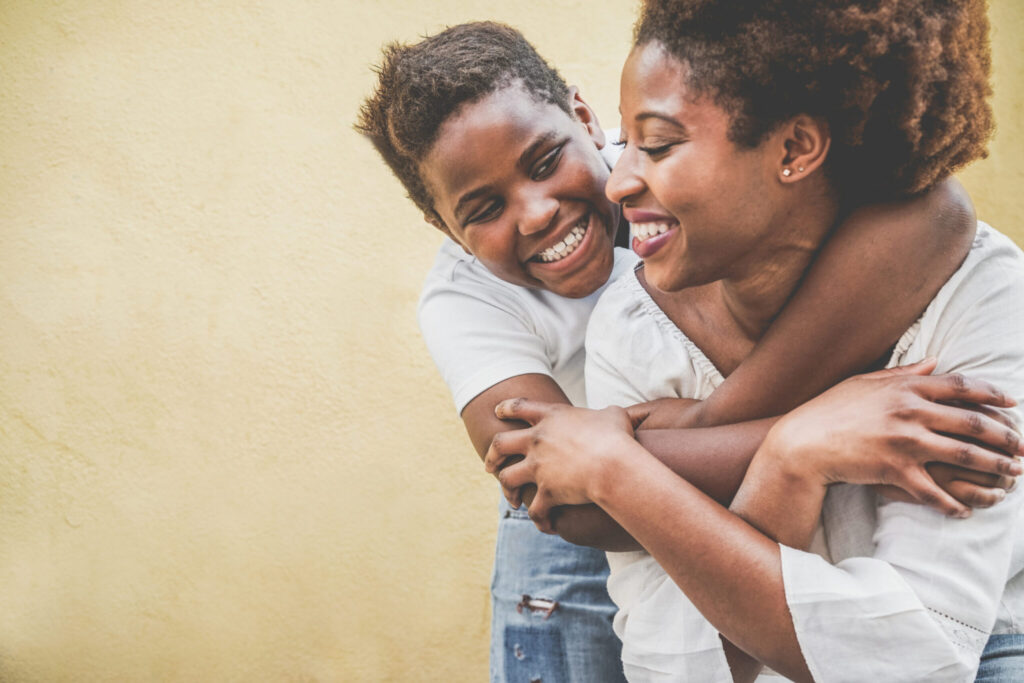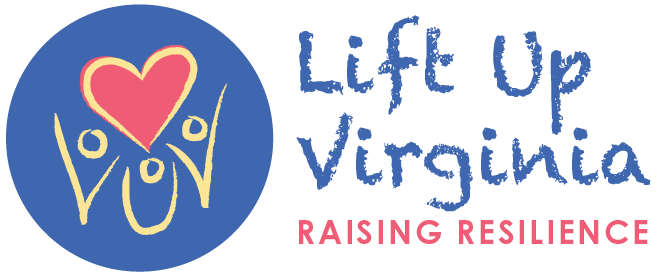by Marrin Scalone, LUV Editor
“Don’t be afraid to show up authentically. I don’t know if there’s such a thing as being an expert in this field. What I truly know is that I’m an expert in me. That doesn’t make me any less skilled and trained at the next person. I could list off certifications and programs I’ve completed, but none of that carries more weight than how I show up into this world.”

When I sat down to interview Amanda Lynch, author, mother, and trauma specialist, I knew of her incredible work across the state. I knew her as a fellow ACEs trainer, a brilliant mind dedicated to the transformation of making Virginia a more trauma-informed state. What I didn’t know yet were the ways in which I’d get to know her soulful, personal strength and deep resilience in which her professional work reflects. Getting to know Amanda in her context, learning of the traumas she and her family have survived, was a true gift. She is an example of purposeful, healing-centered authenticity.
“How did this all begin for you?” I asked her to start our interview.
This is Amanda Lynch’s LUV story.
The Path to Mindfulness
Amanda began her career as a teacher in 2003, followed by her role special education. Shortly after stepping into her career, her best friend, Angel Jackson, passed away due to a domestic violence incident. All at once, her life was enthralled with the post-traumatic grief and loss.
“I remember sitting in the courtroom” Amanda recalled, “and listening to the forensic psychologist testify that they couldn’t find a psychological reason for harm. That really changed the trajectory of how I view teaching. I hoped that in my instruction I could prevent other families from experiencing the loss I did, somehow. So I began to do things like yoga, mindfulness, things from my own personal practice.”
Amanda began practicing yoga and deep breathing techniques for her own grief recovery process, and soon was devoted to integrating both in her classroom.
“I was working with students who didn’t have access to healthy stress reduction. I knew I could bring that space to the classroom. I had no idea what any of this was called, ‘trauma-informed practice’ or buzzwords like that. I just thought these were things human beings needed to feel safe. And you can’t learn if you’re not feeling safe.”
Her career shifted as she began to fall in love with brain-based education and neuroscience. She grew curious about the ways in which traumatic events can reshape our brain and alter our experiences in the future.
“I left teaching not knowing the pandemic was coming, not knowing the kids would be learning from home, how much public education would shift. But I knew I really wanted to write Children’s books. I wanted to coach teachers, caregivers, and community members on the power of mindfulness.”
Amanda did just that. She published her first book, The Mindfulness Room, a children’s book about the benefits and practicality of mindful practice, breathing, and teaching children how to give themselves permission to feel emotions.
Amanda’s husband was her number one fan and biggest push to pursue writing. He also inspired much of her own personal learning about understanding trauma and adversity. “I sort of came into ACEs trying to understand my husband’s mental health. He had a history of ACEs, and I really wanted to dig deeper in what happens when those traumas go unchecked. In the first book, the main character loses her father. As a family, the characters start doing mindfulness practices with their teacher, who’s based on me in the book. But the main character is modeled after him.”
I sat back, fascinated by Amanda’s journey so far. We relished in each-other’s practices and journeys for a moment. “To me, it’s a commitment. Especially within my own stress response and familial traumas. For me it doesn’t really get easier- it’s still something I must be so intention to integrate.
How do you feel that mindfulness has shaped your personal and professional life?” I asked.
“Sometimes mindfulness is a really heavy lift. One thing it’s done is allowed me to be vulnerable about all of the things that are happening- how I’m feeling, if I’m picking up weights that aren’t mine to pick up. With vulnerability there comes a certain level of responsibility and understanding and enduring. When I go to trainings around the country, I’m always trying to be intentional of my consumption, of how much information is too much information.”
When The World Won’t Stop
Amanda’s decision to write and strengthen her family’s own wellness tools couldn’t have prepared her for the tragic loss her family endured. In October of 2022, Amanda’s husband, Marcus Lynch, passed away due to a community violence incident.
“You’d think that grief, loss, and trauma would have been easier because of all the tools and techniques I’ve learned over the years,” Amanda said.
“It has not been. So, I have to allow myself to give grace to others, but also reflect that grace back into myself- It’s probably the greatest mindfulness technique that I walk away with from this experience.”
Amanda’s strength, grit, and deep love for her family radiated from the words she spoke during our interview. She explained the ways in which her own capacity for self-care has shifted following her traumatic loss, and that accepting that change is pivotal.
“My life is in a completely different place than it was in 2019. So, one thing I can do is always set up a good space for my body and my mind. I’m intentional- working here with you, I have the lights dimmed, I have a glass of really cold water on my desk; things that I know will attend directly to my nervous system.”
To bring an intention of self-compassion throughout the day is sometimes our best and most authentic way to be mindful. Incorporating self-forgiveness, check-ins, and allowing space for nervous system regulation can be the key to daily regulation, especially in a post-traumatic state.
“The world doesn’t stop just because something traumatic happened. Things continue to move. As much as I wish for these last 9 months that the world would stop for me, it’s not. I still have to be with my kids, I still have to go and do workshops. I still have to show up for meetings- we all still have to continue.
I think one of my goals is to just help create a world where the universal supports are part of our daily lives. So you don’t need the world to stop, you are mindful wherever you are.” Amanda reflected to me.
We’ve all endured moments in our lives when we just needed the world to stop spinning. Even just for a moment, to have a moment to pause and catch our breath.
Perhaps this is the core of mindfulness; to cultivate within our lives those moments where we make our world stop. With intention and practice, we hit our own pause button. Give ourselves space to breathe, to feel, to be in that pause.
Perseverance Through Purpose
Amanda’s impeccable strength is laced throughout her entire story. Her devotion to family, to love, and to healing through grief shines through every word she spoke. I asked Amanda about this grit, and her experience navigating her work while enduring traumatic loss.
“What advice would you have to someone in the social services field that feels their life story could elevate their ability to connect with others? How do you balance your lived experience within your journey?”
“Fortunately and unfortunately, my personal and professional lives have always collided,” Amanda told me. “I’ve never really drawn a line of separation for why I show up to this work- I don’t know how that’s possible for me. I think we shouldn’t be afraid to show up as our authentic being.
Don’t be afraid to show up authentically. I don’t know if there’s such a thing as being an expert in this field. What I truly know is that I’m an expert in me. That doesn’t make me any less skilled and trained at the next person. I could list off certifications and programs I’ve completed, but none of that carries more weight than how I show up into this world.
Whatever your personal belief is, we’ve been sent here with purpose. At some point, you must pick yourself up and find a way to make meaning from the things that are happening. Hopefully my children’s books change the lives of other kids. There’s purpose in everything if you allow yourself to see it.
I would just encourage folks to use their voice. You have it. Your voice is powerful. Feel empowered by the experiences that shaped you, good or bad.”
In her pursuit of spreading purpose, Amanda has launched a scholarship in Marcus’ name for students who are trauma survivors. The first scholarships were awarded this year. She’s also donated a free library to a local elementary school, featuring her children’s books and activities for families and caregivers to navigate grief and loss.
Amanda hopes to continue giving back through her husband’s honor and allowing her family’s story to cultivate hope.
She also shared her own personal goals for herself and her family, “I’d like to be a full-time writer one day. I hope we come out of this experience as a family. I hope we take care of each other, and that each one of us is being taken care of. I think that’s something I can do a little better in… I’m doing a great job taking care as Mom, but not such a great job taking care of myself at times.
“That’s the long-term family goal, that we come out of this experience with healed scars.”
To learn more about Amanda’s story, including her published books and workshop offerings, please visit https://www.rethinkingresiliency.com.
To learn more about the Marcus A. Lynch Memorial Scholarship, please visit https://www.rethinkingresiliency.com/scholarships .
